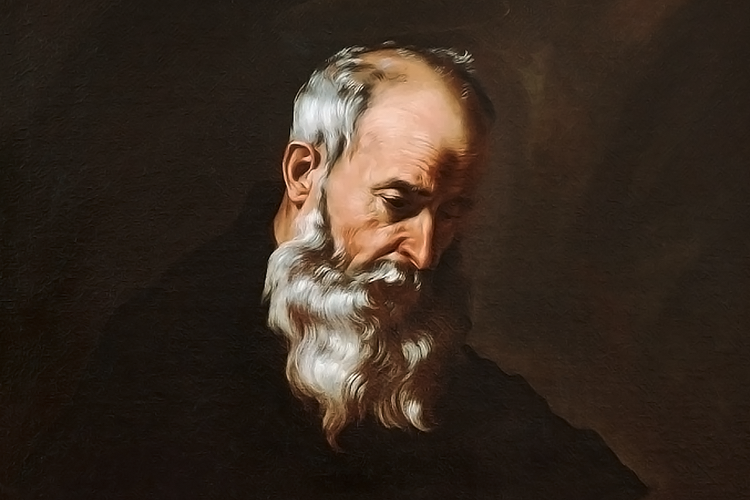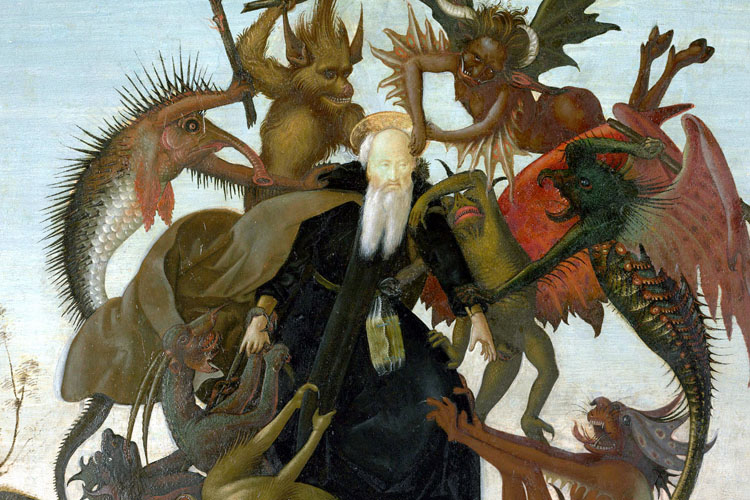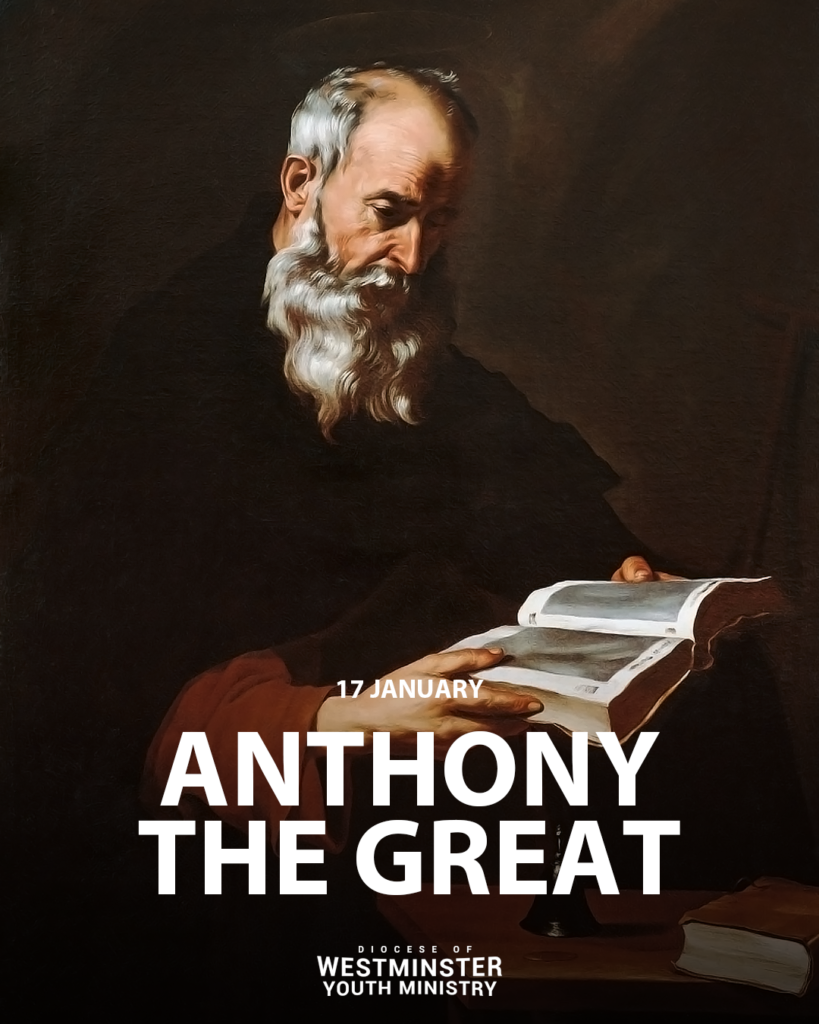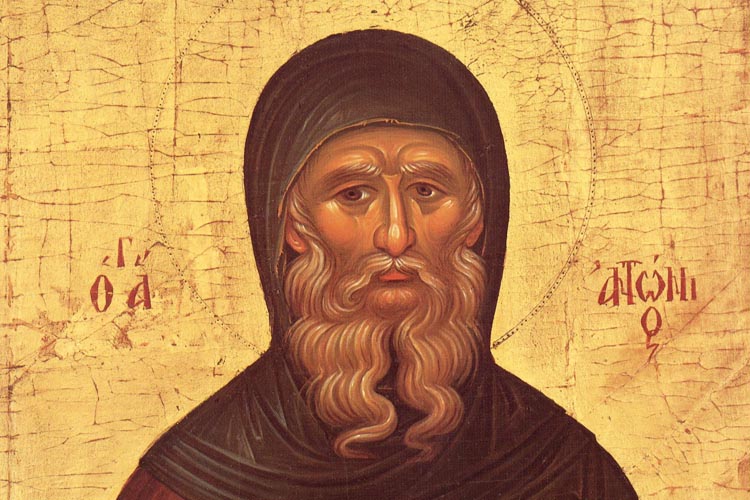Feast Day: 17 January
Saint Anthony the Great is often mistakenly given the title ‘The First Hermit’. This is because of the huge impact his life had on the development of monasticism across the Christian world. While he was not the first hermit he did become the first ‘desert father’ – something we will address later.
Anthony was born in Egypt to a wealthy land-owning family. When he was 18 years old, his parents died and Anthony, being a young man who had a deep passion for God, decided to follow the teachings of Jesus Christ to the fullest of his ability.
Inspired by the words of Jesus in Matthew 19:21 “If you want to be perfect, go, sell what you have and give to the poor, and you will have treasures in heaven.” Anthony gave away some of his family land to neighbours, sold the remaining property and gave the funds that he’d raised to the poor of his city. He then left to live as a hermit.
For the next 15 years, Anthony remained in the area, spending the first years as the disciple of another hermit and paying his way as a swine herd. During this time. he lived a life like many of those hermits and monks before him. He spent long hours of the day in communion with God and used what other time to advise those with worries and help people build their own spiritual life.
What made Anthony different was he went further in his desire for complete communion with God. He decided that unlike all before him who had generally stayed at the outskirts of towns and villages, he was going to go into complete isolation and dependence on God by heading out alone into the desert. He settled in the Nitrian desert about 59 miles west of Alexandria and remained there for 13 years.
During this time the devil fought Anthony by afflicting him with boredom, laziness and mirages of beautiful women, all of which he overcame by the power of prayer. Angered by this and Anthony’s intense worship, the devil beat him mercilessly, leaving him unconscious. When his friends from the local village came to visit him and found him in this condition, they carried him to a church to recover.
After he recovered, he made a second effort and went back into the desert to a farther mountain by the Nile called Pispir. There he lived strictly enclosed in an old abandoned Roman fort for some 20 years. The devil again resumed his war against Anthony, only this time the mirages were in the form of wild beasts, wolves, lions, snakes and scorpions. They appeared as if they were about to attack him or cut him into pieces. But the saint would laugh at them scornfully and say, “If any of you have any authority over me, only one would have been sufficient to fight me.” At his saying this, they disappeared as though into smoke.
While in the fort he only communicated with the outside world by a crevice through which food would be passed and he would say a few words. Anthony would prepare a quantity of bread that would sustain him for six months. He did not allow anyone to enter his cell; whoever came to him stood outside and listened to his advice.
Then one day he emerged from the fort with the help of villagers, who broke down the door. By this time most had expected him to have wasted away or to have gone insane in his solitary confinement. Instead, he emerged healthy, serene and enlightened. Everyone was amazed that he had been through these trials and emerged spiritually rejuvenated. He was hailed as a hero and from this time forth the legend of Anthony began to spread and grow. Anthony went to Fayyum and confirmed the brethren there in the Christian faith before returning to his fort.
After the Diocletian Persecutions, the last and most bloody Roman persecution of Christianity, during which time St Anthony was in Alexandria and fervently apposed the bloodshed, Anthony again returned to his fort. By this time, many more had heard of his sanctity and he had many more visitors than before. He saw these visits as interfering with his worship and went further into the Eastern Desert. He travelled for three days before reaching a small oasis with a spring and some palm trees and chose to settle there. Disciples soon found him out and his number of visitors again continued to grow.
Anthony had not been the first ascetic or hermit, but he may properly be called the “Father of Monasticism” in Christianity, as he organised his disciples into a worshipful community and inspired similar withdrawn communities throughout the Egyptian, Greek and Roman world. His follower, Macarius the Great, was particularly active in continuing his legacy.
There is much more to St Anthony’s story. Due to his popularity and the inspiration he gave during his life, there are many biographies and books of quotes written by people who lived with him throughout his life. To recount them all would be too long but hopefully this article has inspired you to find out more.
Why is Saint Anthony the Great Important?
A reflection from one of our young Catholic community
Saint Anthony was a revolutionary. As Catholics, we believe that our purpose in life is to love God and our neighbour completely, unreserved, and that by doing so, we overcome the sinful nature within us, making us able to completely embrace God and enter into heaven. God helps all of with this journey and development, and one of the most profound ways He does this is by giving us a vocation.
A vocation, put very simply, is a life choice we make to help us learn to love unconditionally. Most people end up marrying as part of their vocation but this is not the only way to learn how to love selflessly. Some people become priests and others take vows of singleness so that they can dedicate their whole life to looking after the needs of others. St Anthony, through his life, revealed another practical way in which we can come to know God and selfless love, that way being living in a religious community.
Due to what St Anthony started, the face and progress of Euro-Asia was transformed. Monasteries became the centres of communities that advanced the understanding of medicine, science and theology way beyond any previous period of history. During the ages following the fall of the Roman Empire monasteries would retain most of what was lost to barbarian invasions and it was this knowledge that helped to rebuild Europe during the Middle Ages.
From Monasteries we also have thousands of saints, full of life and joy. It is no wonder St Anthony is known as ‘The Great’, considering the huge impact he had on the history of the world.
Quotes of St Anthony
Saint Anthony was well known for his insightful and wise quotes. Click here to read a collection of them.



